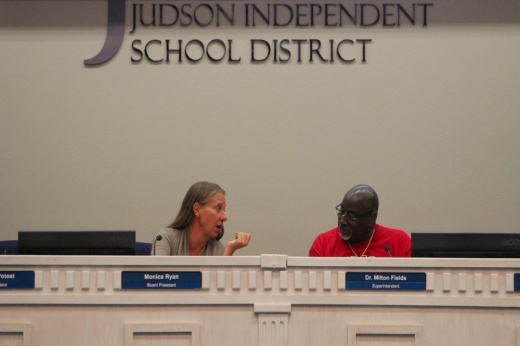On Aug. 6, the Judson ISD board of trustees discussed calling a voter-approval tax rate election, or VATRE. The board consensus was to set the fiscal year 2025-26 district tax rate at $1.1196 per $100 valuation, an increase from the FY 2024-25 rate of $1.0346.
The board looks to call for a VATRE at its Aug. 18 meeting.
How we got here
According to a presentation from Tony Kingman, the district’s new chief financial officer, the district is calling for a VATRE to deal with budget deficits, inflationary pressures and a lack of state funding.
On June 26, the board approved a FY 2025-26 financial budget with $234.16 million in total revenues and $271.38 million in total expenditures, a shortfall of over $37 million.
Kingman said the district deficit has grown due to a number of factors unrelated to operations, including a “flat or declining” state funding environment not giving Judson ISD enough to cover staff cost of living adjustments, costs of supplies and more.
“In short, the reason we are looking at a VATRE is because we are operating within a system that is highly unfavorable for us to have a balanced budget, and we are trying to be responsible in how we address some of the challenges,” Kingman said.
The breakdown
According to Kingman’s presentation, a successful VATRE at a $1.1196 per $100 valuation tax rate would add $24.53 million in new revenue, leaving the FY 2025-26 shortfall at $13.42 million.
Kingman said some homeowners will still see a savings on annual tax bills due to the impact of new homestead exemptions. Senate Bill 4 increases the school property tax exemption on homesteads from $100,000 to $140,000; while Senate Bill 23 increases exemptions for elderly or disabled homeowners.
The presentation provided four examples of homes and the VATRE’s impact on tax bills. A home valued at $250,000 would see an annual savings of $267.84 and a home valued at $350,000 would have an annual savings of $147.84. Some homeowners would still pay more according to the presentation, as a homeowner on a home valued at $550,000 would pay $92.16 more annually, while a homeowner on a home valued at $750,000 would pay $332.16 more annually.
Trustee José Macias Jr. said the state legislature passing exemptions this year makes it an opportune time for the district to pursue a VATRE.
“I really believe that the reason I’ve been supportive with the VATRE is because of this scenario ... the fact that this is the scenario I think gives the VATRE the best opportunity to be supported by our community,” Macias Jr. said.
What the board is saying
Trustee Suzanne Kenoyer said her inclination is to ask for the highest VATRE rate possible.
“It doesn’t make sense to pay for an election and not have that flexibility, should the legislature finally step up and fund us better, then we could reduce the tax rate,” Kenoyer said.
Trustee Laura Stanford said the cuts made by the board during the FY 2025-26 budget process, and future efficiencies, may help the district’s standing with the public come election time.
“I do think that the taxpayers are going to want to see what we’re contemplating for cuts going forward. They need to hear that we’re not just sitting back and waiting to see what happens with the VATRE,” Stanford said.
Next steps
After the VATRE is officially called on Aug. 18, the election will be set for Nov. 4.
Kingman said MoakCasey, an Austin-based education consulting firm, will present its efficiency audit to the district in September. The audit is a financial analysis mandated by the Texas Education Code before holding a VATRE, according to previous reporting by Community Impact.





